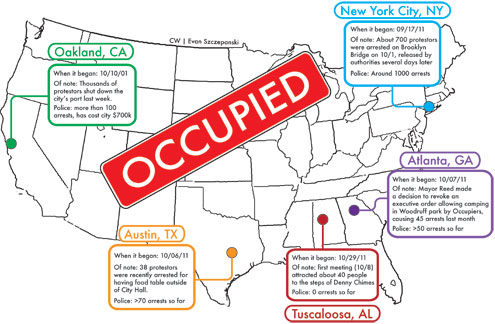 As the Occupy Wall Street movement enters November, many around campus, and even the country, do not seem to fully understand it.
As the Occupy Wall Street movement enters November, many around campus, and even the country, do not seem to fully understand it.
However, some Alabama students, including Lucie Enns, a senior majoring in political science, have taken part in the protests.
“On campus there is a lot of apathy, and this was my outlet to let my activism out,” she said.
According to the popular and, by most counts, official website for the demonstrations, occupywallst.org, the protests are apart of a “leaderless resistance movement with people of many colors, genders and political persuasions.” The website goes on to explain that, “The one thing we all have in common is that We Are The 99% that will no longer tolerate the greed and corruption of the 1%.”
Occupy Wall Street has organized during a period of increased political engagement and unease in the United States.
On Feb. 19, 2009, CNBC financial analyst Rick Santelli ignited what would be known as the Tea Party movement.
“The government is promoting bad behavior,” Santelli said. “We’re thinking of having a Chicago Tea Party. All you capitalists that want to show up to Lake Michigan, I’m gonna start organizing, we’re going to be dumping in some derivative securities.”
Eight days later, Tea Party protests took place in 48 cities across the country. This newfound political energy on the right wing of the American electorate helped fuel the landslide victory for Republicans in the 2010 midterm elections.
After the election of many conservative leaders, liberals have slowly begun to organize in opposition of their perceived extreme agendas.
Sensing the pent up energy on the left wing, Kalle Lasn, a Canadian activist and founder of the anti-consumerist magazine Adbusters, registered the domain name occupywallst.org on June 9, 2011.
Adbusters then began to organize an event to be held on Sept. 17, Constitution Day, in Zuccotti Park, a privately owned park located a block away from Wall Street. The movement has been steadily growing ever since.
“This is a leaderless and peaceful movement without demands at this time,” said Mark Ohtura, a New Yorker who has attended the Protests in Zuccotti Park. “We support no candidate, no party and no platform.”
Enns added to the sentiment of Ohtura’s with her own reason for occupying.
“I’m not protesting Wall Street, I think that Wall Street is vital to the American economic system. But the widening divide between the rich and the middle class is getting worse.”
Aaron Van Scyoc, a freshman at St. Johns University in Queens, has also been to the protests and said the point of the movement is not necessarily to send a specific message.
“I saw anti-war protesters, universal healthcare supporters, environmentalists, gay rights activists, education advocates, amnesty supporters and those protesting our nation’s drug policy,” Van Scyoc said.
However, Van Scyoc also believes that the overwhelming sentiment of the group is on reforming the nation’s financial system.
The movement has spread across the country, with large protests being held in hundreds of cities and communities.
Last week in Oakland, thousands of people joined together in an attempt to shut down the city. Students stayed home from school, as did teachers and some longshoremen from the port of Oakland, which is the fifth busiest in the nation.
Last Tuesday, a few hundred protestors marched to a Bank of America branch in Miami to close their bank accounts with the company.
Even Tuscaloosa is not exempt from the growing movement, as Occupy Tuscaloosa is slowly being organized online.
Many have viewed the protestors as a mix of rabble-rousers, hippies and political radicals who are engaging in a social class war. And the news has not always been positive for the group, as exemplified by the arrest of Tonye Iketubosin last week.
Iketubosin is accused of raping two fellow protestors, one 18 and the other 17.
But Enns said not all protestors are up to the standards of the group, and that “the movement has been infiltrated by people who are going to give it a bad reputation.”
“My cousin’s husband is one of those rich bankers, and we stayed in their home when we were in New York, so this is not a personal thing for me,” she said. “With so many issues, I don’t think class warfare is the way to solve the problem.”









